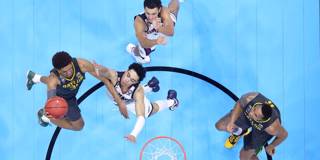The NCAA is asking the US Supreme Court to endorse the fiction that it is preserving amateurism in athletics, rather than presiding over a profitable scheme of labor exploitation. But the fact is that the NCAA's behavior in any other part of the economy would be illegal.
CHICAGO – Last week, as the National Collegiate Athletic Association’s “March Madness” basketball championship neared its conclusion, the US Supreme Court heard a case brought by Shawne Alston, a former college football player, against the NCAA. Alston claims that the NCAA may not restrict certain types of compensation for student athletes. But the case highlights a broader, long-simmering complaint: In the name of preserving amateurism in college sports, the NCAA operates an exploitative system that enables a handful of universities to earn millions of dollars from the work of players who are neither remunerated nor even (in some cases) afforded a decent education.

CHICAGO – Last week, as the National Collegiate Athletic Association’s “March Madness” basketball championship neared its conclusion, the US Supreme Court heard a case brought by Shawne Alston, a former college football player, against the NCAA. Alston claims that the NCAA may not restrict certain types of compensation for student athletes. But the case highlights a broader, long-simmering complaint: In the name of preserving amateurism in college sports, the NCAA operates an exploitative system that enables a handful of universities to earn millions of dollars from the work of players who are neither remunerated nor even (in some cases) afforded a decent education.